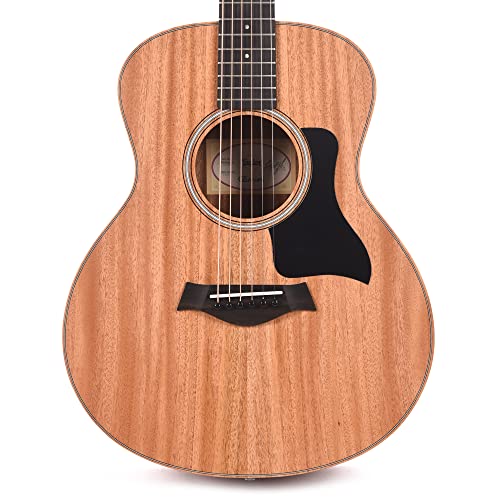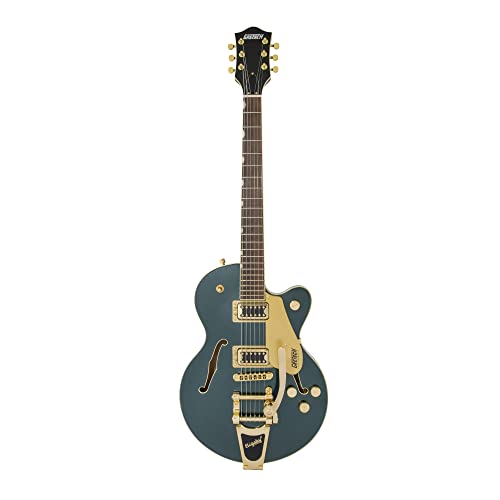When it comes to choosing the perfect guitar for you, there are several different types to consider. Each type of guitar has its own unique sound and playability, so it's important to find the one that best suits your musical preferences.
Taylor GS Mini Mahogany Guitar
The Perfect Guitar for Music Lovers of All Skill Levels
Product information
$599.00
Product Review Score
4.79 out of 5 stars
93 reviewsProduct links
One of the most popular types of guitars is the acoustic guitar. Acoustic guitars are known for their rich, warm tones and versatility. They are great for playing a wide range of musical styles, from folk and country to blues and rock. Acoustic guitars come in various sizes, including dreadnought, concert, and parlor, so you can choose the one that feels most comfortable to you.
Another popular type of guitar is the electric guitar. Electric guitars produce a louder, more amplified sound compared to acoustic guitars, making them ideal for playing in bands or live performances. Electric guitars also come in various shapes and sizes, such as solid body, semi-hollow body, and hollow body, each offering its own unique tone and feel.
Epiphone Joe Bonamassa Signature "Lazarus" Les Paul 2021
Epiphone Joe Bonamassa Signature "Lazarus" Les Paul 2021 - Unleash Your Inner Rock God with This Signature Guitar!
Product information
Product Review Score
4.22 out of 5 stars
182 reviewsProduct links
If you're looking for a guitar with a unique sound, you may want to consider a classical guitar. Classical guitars have nylon strings, which produce a softer, mellower sound compared to steel strings. They are perfect for playing classical music, flamenco, or fingerstyle guitar. Classical guitars also have a wider neck, making them easier to play for those with larger hands.
Finding the Right Size Instrument
When it comes to choosing the perfect guitar for you, size is a crucial factor to consider. The right size instrument can make a huge difference in your playing comfort and overall enjoyment. There are several factors to keep in mind when determining the right size guitar for you.
One important consideration is the physical size of the player. A smaller individual may find a full-sized guitar to be uncomfortable to play, while a larger person may struggle with a smaller instrument. It's essential to choose a guitar that feels comfortable in your hands and allows for easy reach across the fretboard.
Gretsch G5655TG Electromatic Jr. Single-Cut Electric Guitar
Explore the versatile sound and iconic style of the Gretsch G5655TG Electromatic Jr. Single-Cut Electric Guitar
Product information
$899.99
Product Review Score
4.33 out of 5 stars
199 reviewsProduct links
Another factor to consider is the scale length of the guitar. This measurement refers to the distance between the nut and the bridge of the guitar and can impact the playability of the instrument. A shorter scale length is often preferred by players with smaller hands, as it can make reaching chords and notes easier. On the other hand, a longer scale length may provide better string tension and tone for some players.
Understanding Different Guitar Features
Choosing the perfect guitar for you can be a daunting task, especially with so many different features to consider. Understanding the various components of a guitar can help you make an informed decision that suits your playing style and preferences.
One important feature to consider is the body style of the guitar. Acoustic guitars come in various body shapes, such as dreadnought, concert, and parlor. Each body style produces a different sound and offers a unique playing experience. Electric guitars also come in different body shapes, such as solid body, semi-hollow, and hollow body, each offering a different tone and feel.
Another important feature to consider is the type of wood used in the construction of the guitar. The type of wood can have a significant impact on the sound of the guitar. For example, mahogany is known for producing warm and mellow tones, while spruce is known for its bright and articulate sound. Different woods will also affect the overall look and feel of the guitar.
In addition to body style and wood type, you should also consider the type of neck and fingerboard on the guitar. The neck profile and fingerboard material can affect the playability and comfort of the guitar. For example, a guitar with a slim neck profile and smooth fingerboard may be more comfortable for players with smaller hands, while a guitar with a thicker neck profile may be better suited for players who prefer a more substantial feel.
Tips for Testing Out Guitars
Testing out guitars is an important step in finding the perfect one for you. Here are some tips to help you make the most of your guitar testing experience:
1. Start by checking the overall build quality of the guitar. Look for any visible defects or imperfections such as scratches, dents, or uneven frets. A well-made guitar will not only sound better but also be more durable in the long run.
2. Next, tune the guitar before playing it. A properly tuned guitar will give you a better idea of how it sounds and plays. Make sure to use an electronic tuner to ensure accuracy.
3. Experiment with different playing styles and techniques to see how the guitar responds. Test out chords, scales, and riffs to get a sense of the guitar's tonal range and playability. Pay attention to how comfortable the guitar feels in your hands and how easy it is to play.
4. Test out the guitar's electronics if it is an electric guitar. Plug it into an amp and play around with the volume and tone controls to see how versatile it is. Check for any unwanted noise or feedback that could indicate a problem with the electronics.
5. Finally, trust your instincts and go with the guitar that feels and sounds right to you. Don't be swayed by brand names or price tags. The most important thing is that you feel connected to the guitar and enjoy playing it. Happy guitar hunting!



